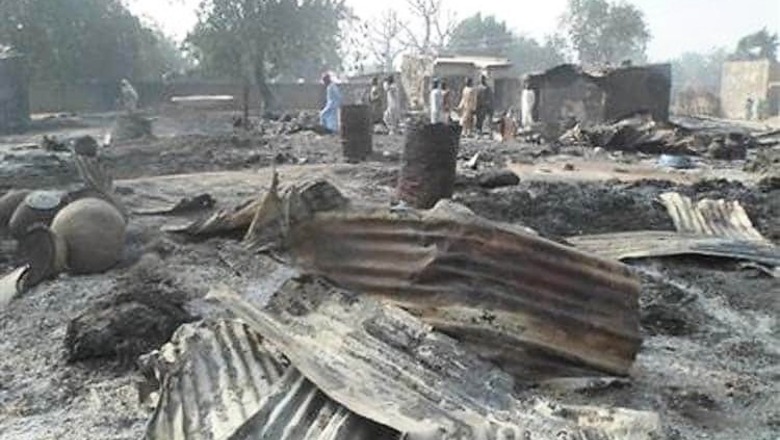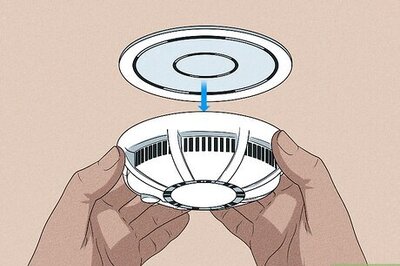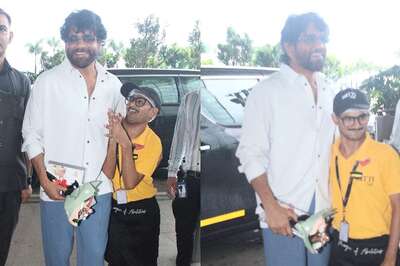
views
Kano: Thirty people were killed late Sunday in a triple suicide bombing in northeast Nigeria, emergency services reported, in an attack bearing the hallmarks of the Boko Haram jihadist group.
Three bombers detonated their explosives outside a hall in Konduga, 38 kilometres from the Borno state capital Maiduguri, where football fans were watching a match on TV. "The death toll from the attack has so far increased to 30. We have over 40 people injured," Usman Kachalla, head of operations at the State Emergency Management Agency (SEMA), said on Monday. An earlier toll from the blasts, the bloodiest in months, gave 17 dead and 17 wounded.
The attack happened around 9:00 pm (1800 GMT), said Ali Hassan, the leader of a self-defence group in the town. The owner of hall prevented one of the bombers from entering the packed venue. "There was a heated argument between the operator and the bomber who blew himself up," Hassan said by phone.
Two other bombers who had mingled among the crowd at a tea stall nearby also detonated their suicide vests. Hassan said most of the victims were from outside the football viewing centre.
"Nine people died on the spot, including the operator, and 48 were injured," Hassan said.
Kachala said the high number of fatalities was because emergency responders had been unable to reach the site of the blast quickly. Nor were they equipped to deal with large numbers of wounded.
"Lack of an appropriate health facility to handle such huge emergency situation and the delay in obtaining security clearance to enable us (to) deploy from Maiduguri in good time led to the high death toll," he said.
Witnesses also said inadequate facilities and lack of drugs contributed to the high death toll. "The people that are currently dying is because of lack of hospital: because some have passed the night bleeding.... even the doctors are complaining that there is no drug," said witness Garba Abdullahi.
There was no immediate claim of responsibility, but the attack bore the imprint of Boko Haram, which has led a decade-long campaign to establish a hardline Islamic state in northeast Nigeria.
The last suicide attack was in April this year when two female suicide bombers blew themselves up outside the garrison town of Monguno, killing a soldier and a vigilante and injuring another soldier.
Konduga has been repeatedly targeted by suicide bombers from a Boko Haram faction loyal to longtime leader Abubakar Shekau. The faction typically carries out suicide attacks against soft civilian targets such as mosques, markets and bus stations, often using young women and girls as bombers.
The jihadists are believed to sneak into the town from the group's haven in nearby Sambisa forest. Eight worshippers were killed when a suicide bomber attacked a mosque in the town last July.
Boko Haram's insurgency has claimed more than 27,000 lives and forced some two million to flee their homes. The violence has spilled into neighbouring Niger, Chad and Cameroon, prompting the formation of a regional military coalition to battle the insurgents. In 2016, a faction of Boko Haram split from the group, becoming the Islamic State West Africa Province (ISWAP). Attacks by the rival groups play into efforts to assert greater influence, according to Yan St-Pierre, a counter-terrorism consultant for MOSECON, a law firm based in Berlin.
He blamed Sunday's suicide attack on the original faction, saying it was to "send a message, to say that they are still very present" despite dwindling resources. Countering ISWAP's strong effective media production and propaganda with ISWAP distinguishing itself as avoiding civilian deaths-- was an emerging focus for the rival faction, he said. "In recent weeks it has been noticed that the Shekau Boko Haram faction has tried to redo its image," St-Pierre added.
Nigerian President Muhammadu Buhari, who was re-elected in February, is facing mounting demands to boost security. The nation of 200 million, the most populous in Africa, is grappling with violence between herder and farmer communities in its fertile central region in addition to the jihadists' revolt.



















Comments
0 comment